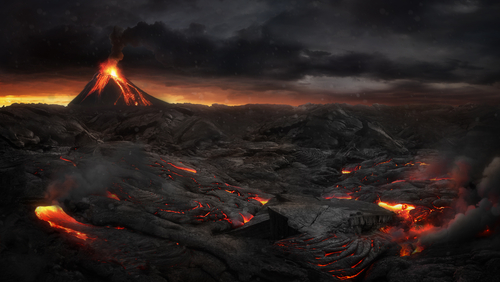
As the land of fire and ice braces itself for a potentially catastrophic volcanic event, the nation of Iceland has declared a state of emergency. The Fagradalsfjall volcano, known for its picturesque landscapes and geological significance, is showing alarming signs of activity that could lead to an imminent eruption.
In recent days, the town of Grindavik has witnessed unsettling phenomena, with massive cracks forming in the earth and steam billowing from the ground. These are clear indicators of magma movement beneath the surface, exerting pressure on the Earth’s crust. The potential eruption threatens not only the local population but also critical infrastructure, including the Svartsengi geothermal power plant, which has been a pioneer in combining electricity generation with hot water heating.
#BREAKING #VIDEO – TURN SOUND ON: Listen to the Magma burrowing below #Grindavik. Volcano eruption seems almost imminent at this point.#iceland #volcano #earthquakes #Emergency #government #Grindavik #naturaldisaster https://t.co/oBy15M2fnb pic.twitter.com/b5gipITxMn
— CryptoWiz – 24/7 #BREAKING News (@TheKryptoWiz) November 11, 2023
The government has taken decisive action by evacuating the 4,000 residents of Grindavik, who now face an uncertain future. The evacuation is a precaution against the dangers posed by ‘fire fountains’ and toxic gases that could be released if the volcano erupts. This level of seismic activity is unprecedented for the Reykjanes Peninsula, though not unfamiliar to the country, which has a long history of volcanic events.
Seismologists and researchers have been closely monitoring the situation, noting the similarities between the current seismic patterns and those that preceded the eruptions of the adjacent Fagradallsfjall volcano between 2021 and 2023. The use of advanced technology has allowed scientists to convert seismic data into audio clips, providing a stark representation of the intensity of the earthquakes occurring in the area.
🌋 Iceland Volcano – Fagradalsfjall
🔊 Sound on to *hear the lava* 🤯h/t @spahn711 – 2021 clip pic.twitter.com/JTlFv7uWr3
— Brendan (@BrendanMcInnis) November 13, 2023
The looming disaster brings to mind the harrowing eruption of Heimaey in the Vestmannaeyjar archipelago in 1973, where lava flows engulfed part of the town. The memory of that event remains vivid in the minds of Icelanders, reminding them of the vulnerability they face living in a geologically active region.
The potential eruption of Fagradalsfjall also casts a shadow over the nation’s economy, particularly the tourism sector. The Blue Lagoon, a popular tourist attraction renowned for its geothermal spa, has been closed due to the threat. The impact on travel and commerce could be significant, echoing the chaos caused by the 2010 eruption of Eyjafjallajokull, which led to the worst air travel disruption since World War II.
During the 2010 event, a series of small volcanic eruptions culminated in a massive ash cloud that disrupted air travel across Europe for nearly a month. The financial toll was heavy, with airports losing millions and numerous travel firms collapsing. The current situation serves as a reminder of the delicate balance between nature’s majesty and its potential for destruction.
As Iceland prepares for what may come, the world watches with bated breath, hoping for the safety of those affected and the preservation of the natural beauty that makes this island nation so unique. The resilience of the Icelandic people, tested time and again by the forces of nature, will undoubtedly be called upon as they navigate this latest challenge.
In the face of such natural adversity, it is crucial to acknowledge the importance of preparedness and the role of government in safeguarding its citizens. Iceland’s proactive measures demonstrate a commitment to public safety and a respect for the power of nature. As the situation unfolds, the spirit of unity and strength that defines the Icelandic community will once again prove indispensable.










